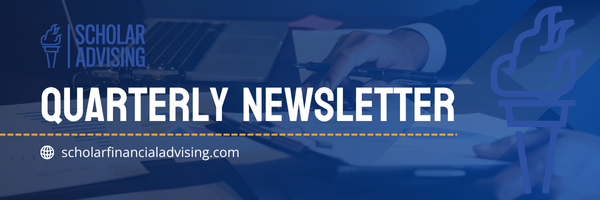Ask An Associate Advisor
In this month’s edition, Derek Cheshire, CFP®, EA discusses the topic:
Planning for a Liquidity Event
A liquidity event, such as selling a business, cashing out equity, or receiving a large inheritance, can be life-changing. While these moments often bring complexity, with the right planning, you can simplify the process and confidently manage your newfound wealth.
Start Early
Most missteps occur because planning begins after the money is received. By starting early, you widen your options to manage taxes, control risk, clarify goals, and prepare your family. Before the funds arrive, engage your team: a financial planner, estate attorney, and tax professional.
Define Your Goals
The first step is identifying what you want your wealth to accomplish. Do you want to fund your children’s or grandchildren’s education, support charitable causes, build generational wealth or spend it all? Establishing your goals provides the foundation for every decision that follows.
Plan for Taxes
Taxes are often one of the biggest considerations. If you are selling a business, review options with your tax professional such as asset versus stock sales, installments, earn-outs, or equity rollovers. Your financial planner can model these scenarios and help determine which structure best aligns with your financial plan and long-term objectives.
Consider Charitable Giving
If philanthropy is important to you, a donor-advised fund or charitable trust may be a valuable tool. These strategies can reduce your tax burden in the year of your liquidity event while also allowing you to fulfill your charitable goals. Work with your financial planner, CPA, and estate attorney to ensure your giving plan integrates seamlessly with your overall estate strategy.
Protect Your Assets
Increased wealth often brings increased liability risk. Review your umbrella insurance coverage to make sure you are adequately protected against lawsuits and creditors. In some cases, family LLCs or irrevocable trusts can provide additional protection and serve as effective estate planning tools.
Align Your Investment Strategy
A major liquidity event also calls for a portfolio review. Align your assets with your risk tolerance and long-term goals for the funds.
Some individuals emphasize preservation, ensuring their wealth lasts a lifetime. Others, with higher risk tolerance, see this as an opportunity to build generational wealth through growth-focused investing. Whatever your approach, a diversified portfolio can balance risk, growth, liquidity, and cash flow needs.
Prepare the Next Generation
If you plan to leave a large inheritance, preparing your heirs is just as important as preparing your portfolio. Share your values and intentions with beneficiaries, and consider making gifts during your lifetime. These gifts can be especially impactful while your children are still building their own wealth, and they help develop financial literacy and responsibility ahead of a larger inheritance.
Final Thought
A liquidity event has the potential to transform your financial life. With proactive planning, clear goals, and the right team of advisors, you can turn this milestone into an opportunity to build lasting security and a meaningful legacy.

Derek Cheshire, CFP®, EA
is an Associate Financial Advisor at Scholar Financial Advising.
|

